Electrical insulating materials prevent unwanted electricity flow in industrial applications, which can lead to equipment damage, electronic hazards, and operational disruptions. These components provide a barrier against electrical conduction and are used to isolate conductive zones and substances. They also ensure equipment’s safe and reliable functioning by reducing the risk of short circuits and leakage.
ESPE Manufacturing’s legacy in the electrical insulator industry spans over seven decades, making us a trusted industry authority! Our seasoned experts are ready to guide clients in choosing the best insulating material tailored to their projects’ needs. We also serve various markets, ensuring that we understand the distinct demands of diverse fields.
The Importance of Electrical Insulation in Industrial Applications
In industrial settings, there is a constant flow of electricity to power machines, equipment, and processes. These electrical systems are vulnerable to short circuits and leaks without proper insulation. Electrical insulating materials provide a strong barrier against shock dangers, eliminating unintentional contact and ensuring personnel may work in a safe environment.
Energy efficiency is a critical concern in industrial applications. Electrical insulation assists in this aspect by reducing power losses through electrical resistance. When currents face fewer obstructions, they flow smoothly, wasting less energy as heat. As a result, total system efficiency improves, energy consumption is reduced, and operating expenses decrease.
Additionally, electrical insulation protects the integrity of delicate electronic components and systems. In today’s technologically advanced landscape, sensitive equipment, control circuits, and microelectronics are omnipresent. This makes them highly susceptible to electrical interference and damage. Proper insulation shields them from electromagnetic interference and discharge, preserving their functionality.
Common Types of Electrical Insulating Materials
Electrical insulators come in various types, each with distinct properties and benefits. Here are some common types and their applications:
-
PLASTICS (POLYMERS)
Plastics are a diverse group of synthetic materials widely employed in insulation. Their versatility lies in their excellent dielectric properties, flexibility, and ease of manufacturing. One example is polyethylene, which is used in power cables due to its high insulation resistance and durability. Meanwhile, polyvinyl chloride (PVC) is cost-effective, making it excellent in electrical wiring. Polypropylene sheets like Formex can be cut, scored and folded to enclose circuitry and devices to protect equipment and personnel.
-
RUBBER
Rubber insulators offer exceptional flexibility and high-temperature resistance. Particularly, silicone rubber is used in extreme heat applications, such as wire insulation and gaskets in the aerospace industry. Another example is EPDM rubber, which is commonly found in connectors and seals due to its weather-resistant properties.
-
CERAMICS
Ceramic insulators are essential for high-voltage power transmission and distribution. Their exceptional electrical resistance and ability to withstand harsh environmental conditions make them indispensable in insulator strings on overhead power lines and substations. Porcelain and glass are typical ceramics used in these applications.
-
FIBERGLASS
Fiberglass-based insulators, like FR4 GPO3 and G11 are widely favored for their mechanical strength and insulating properties. In the context of printed circuit boards (PCBs), fiberglass laminates provide superior electrical isolation and mechanical stability. They are pivotal in underpinning and interconnecting electronic components within various devices.
-
PAPER
Electrical-grade paper, or fish paper is treated with insulating oils or resins to enhance its dielectric properties and thermal resistance. It is often used as an insulator in power transformers, providing effective electrical shielding between the windings. This impregnated paper also guarantees efficient heat dissipation and electric performance.
-
COMPOSITE MATERIALS
Composite insulators combine different substances to create materials with tailored properties. For example, canvas-reinforced epoxy Phenolics offer a balance of electrical insulation, mechanical strength, and thermal resistance. They are frequently used in applications where a combination of these characteristics is essential, like electrical enclosures and insulating support structures.
-
POLYTETRAFLUOROETHYLENE (PTFE OR TEFLON)
Teflon is known for its high-temperature resistance and low-friction properties. It is typically used for its shielding properties in electrical applications, specifically in high-frequency and high-temperature environments. Due to its low loss characteristics, it is also an ideal choice for microwave and radio frequency (RF) cables.
Advanced Materials and Emerging Trends
Advanced materials have become essential in modern applications due to their improved properties and enhanced performance. Here are some innovative insulators that are gaining traction across industries:
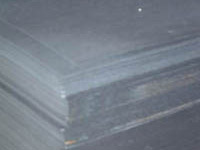
Aramid Paper (Nomex)
Aramid paper — exemplified by the brand Nomex — is highly valued for its thermal and mechanical stability. It can withstand high temperatures and provides superior dielectric strength. This makes it the ideal choice for power transformers and other high-temperature electrical components requiring reliable shielding.
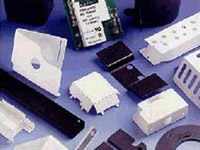
Nanocomposites
Nanocomposite insulating materials incorporate nanoscale particles into a polymer matrix, enhancing dielectric properties and thermal resistance. These insulators find applications in high-frequency electronics and miniaturized devices, as their enhanced characteristics contribute to more efficient and compact designs.
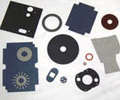
Liquid Crystal Polymers (LCPs)
LCPs are known for their low dielectric constant and high-temperature resistance and are ideal for high-frequency electronic components. They are utilized in producing PCBs and antennas, where maintaining signal integrity and stability are critical. They can also be used to manufacture high-performance microwave components, including RF connectors and filters.
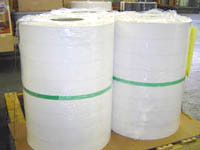
Silicone Elastomers
Silicone elastomers offer flexibility, high-temperature resilience, and excellent dielectric properties. Their versatility makes them suitable for applications like cable jackets and insulating sleeves, particularly in industries where exposure to extreme conditions is common. In addition, these elastomers are favored for their biocompatibility and resistance to moisture.
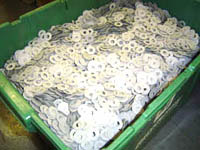
Polyimides
Polyimides, like Kapton, are distinguished by their remarkable electrical insulating properties, thermal stability, and chemical resistance. They serve well in aerospace and semiconductor industries for applications in harsh environments, ensuring the reliable operation of critical electronic systems. They are also employed in creating lightweight, high-performance materials for aerospace and aviation.
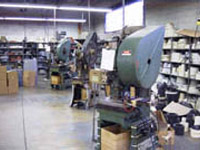
Graphene-Based Materials
Graphene and its derivatives are promising alternatives as advanced materials for electrical insulation. Their high thermal conductivity, exceptional mechanical strength, and electrical resistivity make them ideal for efficient heat dissipation applications.
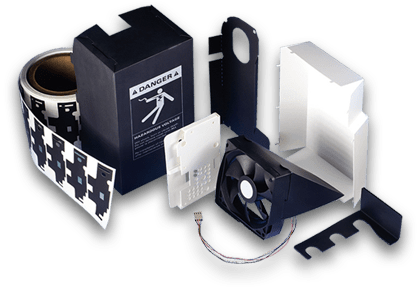
Nanofluids
Nanofluids comprise engineered liquids with nanoparticles that enhance their dielectric characteristics and heat transfer capabilities. They are used in electrical transformers, where cooling and insulation are necessary for maintaining the equipment’s reliability and performance. They also have applications in advanced cooling systems for high-power electronic components like data centers.
Relevant Industry Standards and Safety Guidelines for Electrical Insulators
Industry standards and safety guidelines ensure the secure use of electrical insulating materials in various applications. They are established and enforced by national and international organizations, setting the benchmark for material specifications, testing methods, and safety protocols. Furthermore, they maintain electrical systems’ integrity and safeguard against potential hazards.
International regulations like those established by the International Electrotechnical Commission (IEC) and the International Organization for Standardization (ISO) focus on safety practices and material specifications worldwide. They address a wide range of topics, from the performance of insulators to the testing methods used to evaluate their properties.
Safety guidelines and regulations continually evolve to keep pace with technological advancements and emerging materials. Therefore, professionals in the electrical industry must stay informed about these developments to remain compliant and contribute to the ongoing improvement of practices. They must also prioritize training and education to ensure that personnel know the latest safety protocols.

ESPE Manufacturing: Your Source for Premium Electrical Insulators
Over the years, ESPE Manufacturing has consistently showcased its expertise in distributing high-quality insulating materials. Our commitment to excellence is not just a principle but a practice. Whether your project involves power distribution, electronics, or any other application, we are well-prepared to assist you in selecting the optimal insulator.
Contact us
